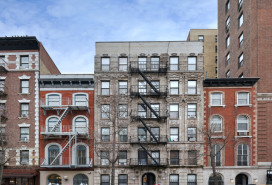Best of Brick: Security deposit self-defense

As part of BrickUnderground’s ongoing effort to demystify the NYC rental experience (see our Renter's Survival Kit), we're turning our attention to security deposits.
You may already be familiar with one important bit of advice: Take pictures of the apartment the way you find it before moving in (focusing on any areas that show wear and tear) and of the way you leave it, after you’ve moved all your stuff out.
It’s great advice, but it will only take you so far.
While many landlords behave honorably when it comes to taking proper deductions and returning your 1+ month’s rent in a timely fashion, others overcharge for repairs, deduct for things they shouldn’t, or simply hang onto your deposit to see how hard you’ll fight for it.
That’s one part of the security-deposit problem. Another has to do with justifiable confusion about some finer points of security deposit law: For instance, many renters are shocked to find that expensive improvements they made to the apartment may need to be ripped out, at their expense, even if the landlord agreed to the improvements in the first place.
We asked Manhattan real estate lawyer Steven Wagner of Wagner Berkow to help us get to the bottom of the security deposit quagmire by answering some common questions, below. If you don’t see your question here, post it below and we will endeavor to answer it.
How much security deposit can a landlord ask for?
If the apartment is not rent-stabilized, a landlord can ask for any amount, though a month’s rent is customary. If you’re asked to pay the first and last month’s rent plus a security deposit, the last month’s rent is also considered a security deposit.
If the apartment is rent-stabilized, the landlord is only allowed to take a month’s rent. (FYI, that’s why rent-stabilized apartments aren’t suitable for people with credit problems or who don’t meet income or employment requirements, obstacles often surmounted by a larger-than average security deposit.)
Whose money is the security deposit?
Your money is supposed to be held by the landlord in trust for you, and it should not be co-mingled with the landlord’s money. The landlord must tell you the name and address of the bank in which the money is deposited, the account number in the bank where the money is held, and the amount including interest. The bank must be located in with the state of New York.
Does the landlord have to pay me interest?
If you are in a building with six or more apartments, you are entitled to interest, although the landlord is entitled to keep one percent of the security deposit each year as an administrative fee. Thus, if your security deposit is $1,000, and the interest earned is at a rate of 2.5%, the deposit earns $25, you get $15 your landlord is allowed to keep $10 per year. You have three options as to how the interest is handled: You can have the interest given to you, you can use it to pay a part of the rent or you leave the money in the security deposit account.
What is my landlord allowed to deduct from my security deposit?
Generally speaking, your landlord can deduct for (1) the reasonable cost of repairs beyond normal wear and tear (see below), (2) damage you caused to the apartment, and (3) unpaid rent.
(Note that your landlord cannot keep your security deposit just because you broke your lease if you found a qualified tenant to replace you and the landlord incurred no additional expenses as a result of your breaking the lease. For more info, see How to Break a Lease.)
Does my apartment have to be returned to its original condition?
This is one of those unenforceable lease provisions. “There is case law to support that even if your lease says the apartment has to be returned to its original condition, courts will nevertheless allow reasonable wear and tear,” says Wagner.
What’s considered normal wear and tear?
The general rule is that reasonable use and wear includes natural deterioration and decay resulting from time and normal use, but does not include damage caused by a renter's neglect or misuse.
Courts determine on a case by case basis what is reasonable. A stove encrusted with baked-on goo after a one-year lease may not be reasonable, whereas it might be after a 15-year-lease. There is case law that suggests the following things do not automatically justify deductions from your security deposit:
- The placement of nails into walls or other support devices, even heavy duty nails.
- Repainting of ceilings and walls that can be covered by one coat of paint.
- Lightly scratched floors.
- Violations of rules by you (such as smoking in non-smoking building) so long as the landlord didn’t incur extra expense because of it.
- Extermination (of bed bugs, for example) unless the landlord can prove you brought them in.
What goes beyond normal wear and tear?
- Removal of debris, rubbish and refuse (don’t forget the refrigerator). Your apartment should be broom swept and free of trash and belongings.
- Though there is no case law on this point, it’s conceivable that crater-like holes left behind by huge nails or anchors (such as those used to hang a flat-screen tv) would be considered unreasonable.
- Cracked tiles, damaged countertops, deeply scratched floors, odors caused by heavy smoking (eg requiring replacement of carpet), cigarette burn marks or other burn marks in kitchens.
- Alterations or improvements to the apartment if (1) you failed to get the landlord’s authorization in writing if required by the lease, and/or (2) there is a provision in the lease requiring your to restore the apartment to its pre-altered state. (Note: Your landlord can agree to waive this provision—just make sure you ask and get it in writing.)
- If you paint the walls unusual “custom” or “designer” colors, that could result in deductions if an additional coat of paint is required to cover it.
Does my landlord have to tell me what he’s going to charge me for and give me an opportunity to fix it first? Do I have a right to be present at the walk through?
If the walk through is done after you’ve relinquished the apartment, you have no legal right to be present. Try to arrange for a walk-through before you turn over the keys to the apartment, so you will have time to fix things yourself. Note that “there is nothing that says the landlord has to give you a chance to fix things either before or after the lease is over," says Wagner. "You, as tenant, are responsible for figuring out what is reasonable wear and tear.”
What if I think my landlord is overcharging me for repairs, repainting, etc., or making improper deductions, or just won’t give back my security deposit?
If the amount in dispute is no more than $5,000, small claims court is your best option. If the amount is over $5,000, you can hire a lawyer and/or file a complaint with the New York State Attorney General. In either case, the burden is on the landlord to prove damages warranting the withholding of a security deposit.
- Overcharging for repairs: If you don’t make repairs yourself, the landlord has the right to do it. However, there is a good faith requirement in every lease: The cost has to be “reasonable,” and you can let a small claims court judge decide whether it was reasonable or not. You might need to present some evidence such as pictures showing the actual condition. Or if you’re disputing the cost of painting your apartment, for example, give the measurements of your studio apartment to support your claim that it could not possibly have take three days to paint.
- Wrongful deductions or withholding of your deposit: In small claims court, make sure to bring photographs of the apartment when you moved in and when you moved out, receipts for any cleanup or repairs that were performed in the apartment prior to vacating it and, if possible, one or two witnesses who can describe from personal knowledge the conditions in the apartment when you moved in and when you moved out.
Can I apply my security deposit to my last month’s rent?
Legally speaking, this would be a breach of your lease. The landlord can still use security for repairs and sue you for the last month’s rent and charge a late fee. [Ed.’s note: In practice, holding back your last month’s rent can remove the landlord’s incentive to fabricate claims for damages, as a landlord is less like to sue you for unpaid rent if the claims against your security deposit are bogus. If you have damaged the apartment, that’s another story.]
How long can my landlord hold onto my security deposit after I move out?
A landlord can keep your security deposit for a “reasonable” amount of time, roughly interpreted as 30, unless a longer period (45 or 60 days usually) is set out in the lease.
Related posts:
Renter's Survival Kit
The 5 Biggest Unenforceable Lease Provisions
Confessions of an On-Site Leasing Agent
3 Reasons You Might Not Owe Rent After All






















